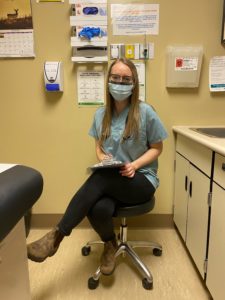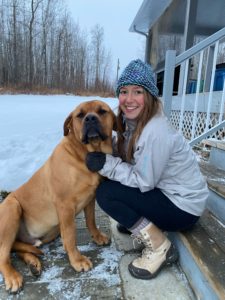As a junior high school student in Lac La Biche, Kelly Anderson had big plans to travel the globe to provide medical care to the vulnerable.

– Photo supplied by Kelly Anderson
Anderson was intrigued after hearing a presentation from Doctors Without Borders. She decided that relief work overseas would be an exciting career path.
“I don’t think my parents ever really expected me to actually follow through with becoming a doctor,” she said. “People at a young age decide on one thing they want to be and then change their mind about 500 times.”
Fast forward to university, and Anderson’s plan to be a doctor is nearing fruition.
What’s changed, though, is that she’s come to recognize that it’s not necessary to travel far away from home to help those in need.
“When I was a lot younger, I thought everyone in Canada had the same opportunity and access and means available to them. I had quite a naive view of Canada and the world,” Anderson explained.
“The more you get to know the hardships of the people who live right in the same areas you live, the more it makes sense to just stay in your own community and try to fill the gaps that are here rather than go somewhere else. Here, I feel like I could actually make a bigger difference.”
The third-year University of Alberta medicine student sees herself practising as a family doctor, possibly in northern Alberta or the Northwest Territories when she wraps up her training.
“People have all been so supportive of me, even patients that I’ll see at the clinic who I’ve never met before. They ask where I’m from, and just assume it’s going to be Calgary or Edmonton. When I say that I was born and raised here, they just get so excited for me and start asking if I’m going to come back and work here when I’m done. There’s just an overwhelming amount of support that I really wasn’t anticipating.”
– Kelly Anderson, third-year medical student
Anderson, who shadowed supportive community physicians while in high school, has had a good taste of rural medicine since September. That’s when she moved back to her hometown to do a clerkship, or work experience, at the Associated Medical Clinic of Lac La Biche with preceptor/supervisor, Dr. Richard Burkill.
“One of the big draws for a practice in rural is that you get to do a lot of clinic time and really get to know your patients,” said Anderson.
Rural postings are ideal in that they can encompass a variety of responsibilities including emergency shifts, surgery cases in some hospitals, as well as the ability to follow patients through their entire pregnancy, delivery, and post-natal care.
The pandemic has also been a great learning experience.
Initially, Anderson wasn’t able to work with any potential COVID-19 patients, but the University of Alberta’s policy changed this past January when officials decided that the hands-on experience was an integral training opportunity.
“It made the pandemic a lot more real, because I hadn’t even really known anyone personally who had contracted COVID,” said Anderson.
“I have patients in the hospital that I’m caring for and the impact it’s had on their health was pretty destructive. It’s tough to see, but definitely a good learning experience in how to keep up to date with all the different research that’s coming out and seeing the way that physicians here really work together and try to find the best options for all of their patients.

– Photo supplied by Kelly Anderson
“It’s been really cool to see how much of a team effort it is and how much support there is for rural doctors” by urban health-care providers sharing COVID-19 advice.
Anderson said it’s exciting working alongside physicians who watched her grow up and later encouraged her to pursue a medical career when she shadowed them for work experience in high school.
It’s not just the doctors who are familiar. Anderson recognized that she might know some of the patients, too.
“I was a little bit apprehensive at first wondering how it would go if I saw someone from high school. Would it be really awkward? Or [what] if I see an old teacher?” she recalled.
“People have all been so supportive of me, even patients that I’ll see at the clinic who I’ve never met before. They ask where I’m from, and just assume it’s going to be Calgary or Edmonton. When I say that I was born and raised here, they just get so excited for me and start asking if I’m going to come back and work here when I’m done. There’s just an overwhelming amount of support that I really wasn’t anticipating.”
It’s a proud moment as well at the local school she attended.
“Having Kelly home is not only a way for her to serve her community and work with the very doctors [who] mentored her, but it provides encouragement for future high school students from our community to see her career path in medicine progress,” said Lisa Dribnenki who is the career counsellor/career program coordinator at J. A. Williams High School.
“Whether she is in clinic, in the community, or in nature, it feels amazing to see her at home and watch her succeed…. As a career counsellor, there is no better reward than helping students begin their career journey and achieve their goals.”
— Lorena Franchuk
Did you enjoy this article?
Subscribe to the Rural Health Beat to receive more articles about positive developments in rural health.
